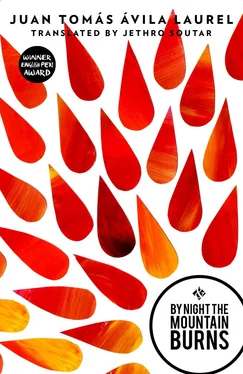Juan Ávila Laurel - By Night the Mountain Burns
Здесь есть возможность читать онлайн «Juan Ávila Laurel - By Night the Mountain Burns» весь текст электронной книги совершенно бесплатно (целиком полную версию без сокращений). В некоторых случаях можно слушать аудио, скачать через торрент в формате fb2 и присутствует краткое содержание. Год выпуска: 2014, Издательство: And Other Stories Publishing, Жанр: Современная проза, на английском языке. Описание произведения, (предисловие) а так же отзывы посетителей доступны на портале библиотеки ЛибКат.
- Название:By Night the Mountain Burns
- Автор:
- Издательство:And Other Stories Publishing
- Жанр:
- Год:2014
- ISBN:нет данных
- Рейтинг книги:5 / 5. Голосов: 1
-
Избранное:Добавить в избранное
- Отзывы:
-
Ваша оценка:
- 100
- 1
- 2
- 3
- 4
- 5
By Night the Mountain Burns: краткое содержание, описание и аннотация
Предлагаем к чтению аннотацию, описание, краткое содержание или предисловие (зависит от того, что написал сам автор книги «By Night the Mountain Burns»). Если вы не нашли необходимую информацию о книге — напишите в комментариях, мы постараемся отыскать её.
By Night the Mountain Burns — читать онлайн бесплатно полную книгу (весь текст) целиком
Ниже представлен текст книги, разбитый по страницам. Система сохранения места последней прочитанной страницы, позволяет с удобством читать онлайн бесплатно книгу «By Night the Mountain Burns», без необходимости каждый раз заново искать на чём Вы остановились. Поставьте закладку, и сможете в любой момент перейти на страницу, на которой закончили чтение.
Интервал:
Закладка:
Out in the waves the canoeman was worried too. He knew that if he lost control, the waves could flip the canoe over, sending the woman overboard, and that in the speedy approach to the sand, the canoe could smash into her father and something serious could then happen to either of them. To the woman, for she wasn’t used to how the sea behaved, and to the old man, because of his age, because he wasn’t used to the water and because, as we could all now see, he was sick. So, quite close to the shore, the canoeman lay his paddle down, jumped into the water and grabbed hold of the back of the canoe. He wasn’t heavy enough to halt the canoe or stop it being violently pulled in to the beach, but his efforts had some effect. The canoe came rushing in onto the sand and the canoeman told the woman to get out right away, something women can’t really do at speed. But our mother was already soaked, so there was no need for her to take care, and she got out as fast as she could. The next thing was to try and keep the canoe upright so that the waves would help push it up the beach, even if just a bit. Then our hands and the hands of our mother were needed, for while the two men held the canoe steady, we had to unload it as quickly as possible and take everything as far away from the water as possible. Everything, no matter how heavy it was. We gave it our all, and we dripped with sweat, even though we were in the water, and we managed to get the canoe unloaded. Mission accomplished. But then we had to move everything again, further up the sand, for the tide was coming in fast. So we did that too. When it was all done, grandfather told our mother, the one who had been in the canoe, to take us home. He hoped it wasn’t too late to contribute to the offering to the king, so he said to tell grandmother to take the water filter that was on the table in his room. He said all this in a voice that was so low we couldn’t make it out. We only knew what he said because our mother told us afterwards. And because she was being honest with us, we dared ask her about what grandfather had strapped to his side, or stomach. What was it?
We did as grandfather said and carried the load home on our heads, and when we got there grandmother brought the water filter down to take for the king. It was a sort of bottle, like a vase, and I knew of it because it was one of the things we’d seen in grandfather’s room when he’d gone out, which happened so very, very rarely. I liked that filter a lot and considered it a precious item. It had a tap on the front, in the bottom corner. I thought the filter was the most beautiful object in the whole house, certainly the most beautiful thing I’d seen upstairs, and it made me sad to see grandmother taking it away. That afternoon I didn’t go down to where they performed the orations. I wanted to watch the canoes from the shore nearest to the house. I didn’t want to be around other people while I was busy questioning whether the king took what was tipped in the water for him. I wanted to be on my own, able to take it all in and keep my doubts to myself, my doubts about the people in the canoes not looking. Not looking to see who took the things, out of fear of what might happen to them. Practically the entire island was gathered by the vidjil , filling the beach from one end to the other. I think the only people not to watch the ceremony were grandfather and the canoeman. When we left the beach with our loads on our heads, I was at the rear, behind my other brothers and sisters, and I looked back to see grandfather and the canoeman sitting on the beach talking. It was one of the very few times I saw grandfather talk and that canoeman was one of very few people to hear his voice. What did they talk about? What did grandfather say to him? Interesting things no doubt, so interesting that a few months later, the following thing happened.
One day, in the middle of the night, when we were already in bed, we heard adult voices. In truth, adults were the only ones allowed to speak at night. What was going on? Well, a young man had come running from his house crying because he’d gone to live with a woman and the woman wasn’t intact. Not intact? He cried, because this evidently pained him a great deal. It turned out the woman was my grandmother’s niece and she’d been raised in our house. The man? The very same canoeman we’d left talking to grandfather on the beach by the cemetery. Over time he’d been through all the formalities required to marry a woman from the family, and I guess one of the things he’d had to do to earn the right was go to the plantation to bring that load back by sea. Why did they take so long? Was he trying to convince that mother of ours to do something? Do what? Whatever it was, there was nearly a catastrophe because of it. So anyway, one night the canoeman came to the house crying and complaining that his woman wasn’t intact. It was their first night together, but what was he hoping to do on their first night? He was most aggrieved because she wasn’t intact and so he cried all the way from his house, on the other side of the village, to our house. Or so I was told. In fact, the word used in our language is not quite the same as intact, but it can be translated like that. It was only later, when I was more grown-up, that I properly understood what he was upset about. The man had expected to be the first man in the girl’s life. He wanted her to be a virgin, and it had been believed, or at least the man believed, that she was. But somehow he found out she wasn’t and this pained him; in fact, it pained him so much he cried all the way from his house to our house. When I understood the real ‘flesh’ of the story, I laughed a lot. What had he been planning to do with her that he could not do now that he’d found her as she was? Some people even said he arrived practically naked as well as crying. I’m not sure I believe that, although I consider both to be equally over-the-top reactions. Is the disappointment at finding out your woman is not a virgin really so great? I couldn’t believe it. I don’t know how they resolved that case, and I hope it didn’t cause trouble for grandfather, as he was probably the one who arranged the relationship, otherwise what were they talking about on the beach by the cemetery? As I said, they stayed behind on the beach, and I don’t know whether that young man already knew about the bag grandfather had strapped to his stomach or whether he saw it then for the first time. But either way, they likely exchanged confidences, for that young man knew of grandfather’s troubles, that’s to say he knew grandfather suffered from an illness that required a bag being strapped to his side. And from that day forth I began to understand my grandfather a little better. When I asked what that bag was, I did so with tears in my eyes. And the tears came because of how I felt. I felt sorry for him, and I thought about how his life had seemed so strange to us that we’d even gone into his sleeping room to see what he had in there. And so now I should tell you what we saw. But after we’d been in there, when we came out, we made the sign for silence with fingers on lips. We were the only ones who knew what we’d seen, and we decided not to tell anyone. We decided not to tell anyone because they might tell our mothers, or our grandmother, and then our grandfather would find out that we’d been looking at his things in his absence, and this could lead to severe punishment. Yes, what we saw made us afraid, but with that gesture of fingers on lips, we promised not to tell anyone. And we kept our mouths shut forever. Which is why even now, I can’t really tell you what we saw.
That bag. Grandfather had no anus and he had that bag to collect what could not come out of him in a natural way. How long had he suffered from such a thing? The illness probably caused him to lose his job on the boat he worked on. All this makes me feel very uncomfortable, and has done ever since I first found out about it. It must have been awful to live back then with an illness like that. What happened to him? How did the illness start? Where did he put the bag? How many people knew about it? The illness was probably also the reason why he lived separate from the rest of us, why he didn’t go to the vidjil , why he didn’t fish. I now view the way he conducted his life as entirely reasonable. And let me repeat what I said before: I never saw him eat. I never saw him eat anything at all. And I guess that was because he couldn’t eat just anything. I say this because I don’t think it was a simple matter of that bag filling up from time to time and having to be emptied. I’d find it very hard to live with an illness like that. Not being able to lead a normal life on an island where life was hard enough as it was, for the island had nothing! When I found out, I decided grandfather had actually been a hero. But even so, his illness didn’t explain everything. What did the haircut have to do with it? Was it some kind of pledge? A ritual of some sort? I know it was often said that men who worked on boats kept many secrets and made many pacts. A lot of things were said about men who worked on boats. But I just don’t know, for he was gone before I had the chance to find out about that terribly ugly haircut. Half his head shaved, and he took care to keep it like that. Was it not something that people really ought to have asked him about? I once drew a picture of my grandfather, of when I saw him on the sand with half his body in the water, not wearing any trousers, on the beach by the cemetery. He was as thin as a thread, naturally, for he didn’t eat anything because he had no anus to expel what wasn’t needed. But you didn’t notice he was skin and bone when he was dressed. My grandfather.
Читать дальшеИнтервал:
Закладка:
Похожие книги на «By Night the Mountain Burns»
Представляем Вашему вниманию похожие книги на «By Night the Mountain Burns» списком для выбора. Мы отобрали схожую по названию и смыслу литературу в надежде предоставить читателям больше вариантов отыскать новые, интересные, ещё непрочитанные произведения.
Обсуждение, отзывы о книге «By Night the Mountain Burns» и просто собственные мнения читателей. Оставьте ваши комментарии, напишите, что Вы думаете о произведении, его смысле или главных героях. Укажите что конкретно понравилось, а что нет, и почему Вы так считаете.












